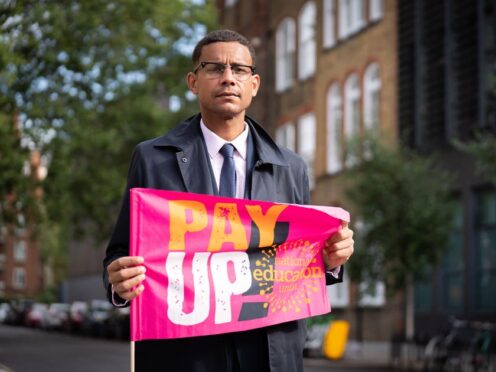
Teachers will debate whether the largest education union in the UK should “build capacity” to deliver national industrial action over pay and funding.
Delegates at the National Education Union (NEU) annual conference in Bournemouth are due to vote on whether the union should campaign for a “fully funded above inflation pay rise” for 2023/24.
An urgent motion, due to be debated in a private session at the conference on Thursday morning, suggests NEU members are “prepared to act industrially” if Rishi Sunak or Sir Keir Starmer “fail to deliver” on teachers’ pay.
It comes after an overwhelming majority of NEU teacher members in England and Wales who took part in the preliminary ballot said they would strike to secure a pay rise and further funding.
Daniel Kebede, general secretary of the NEU, said the Government should take the union’s preliminary ballot “very seriously”.
More than half of NEU teacher members – some 150,000 – in state schools and sixth forms in England and Wales took part in the preliminary electronic ballot.
The motion on a pay and funding says: “No matter who is in government, the bedrock of our power is collective organisation and action at the workplace.”
It calls on the union’s executive to “review, and learn from, the indicative ballot to build capacity to deliver local and national industrial action.”
It adds: “Conference congratulates officers, reps and members in achieving a strong result in our indicative ballot on pay and funding.
“Conference believes the strongest use of the ballot at this moment is to serve notice on Rishi Sunak, and Keir Starmer, that members are prepared to act industrially if they fail to deliver.”
The motion notes: “Conference understands that Labour will likely form the next government.
“Whilst we will be able to work with a Labour government on some policy areas, we will need to campaign against them on others.”
📢#NEU2024 is now open!
Welcome to all delegates on day 1 of NEU conference 2024.
We look forward to great debate and discussion of the issues affecting educators and the children we teach. pic.twitter.com/2OT8804G3S
— National Education Union (@NEUnion) April 3, 2024
Speaking on the first day of the annual conference, Mr Kebede said the Government, including Education Secretary Gillian Keegan, should take the union’s preliminary ballot on possible strike action “very seriously”.
He told BBC Radio 4’s Today programme: “I would say there is a mood of desperation, if we are being honest.
“The profession is very much on its knees, morale is at an all-time low.”
Referencing a “crisis in recruitment and retention” in the profession, Mr Kebede said: “Quite simply, if we continue on this direction of travel, education will grind to a halt.”
Delegates at the annual conference of another teaching union, the NASUWT, passed a motion on Saturday in Harrogate, North Yorkshire, which called for political campaigning to “take priority over industrial action”.
Overall, 78% of NASUWT teacher members in England who took part in the union’s consultative ballot voted against holding a formal ballot for industrial action over pay and working conditions.
Last month, the Department for Education (DfE) said in evidence to the School Teachers’ Review Body (STRB) that teachers’ pay awards should “return to a more sustainable level” after “two unprecedented years”.
In July last year, the Government agreed to implement the STRB’s recommendation of a 6.5% increase for teachers in England, and co-ordinated strike action by four education unions was called off.

Enjoy the convenience of having The Sunday Post delivered as a digital ePaper straight to your smartphone, tablet or computer.
Subscribe for only £5.49 a month and enjoy all the benefits of the printed paper as a digital replica.
Subscribe